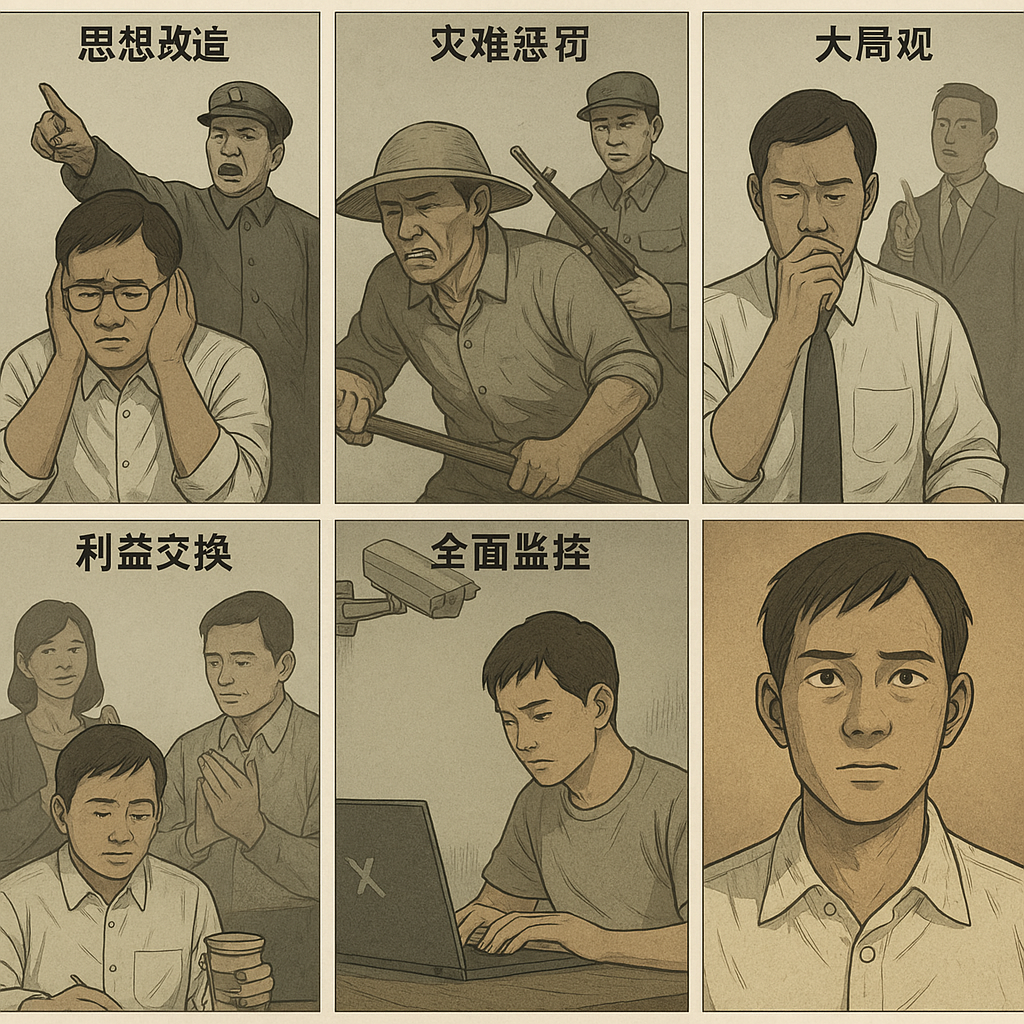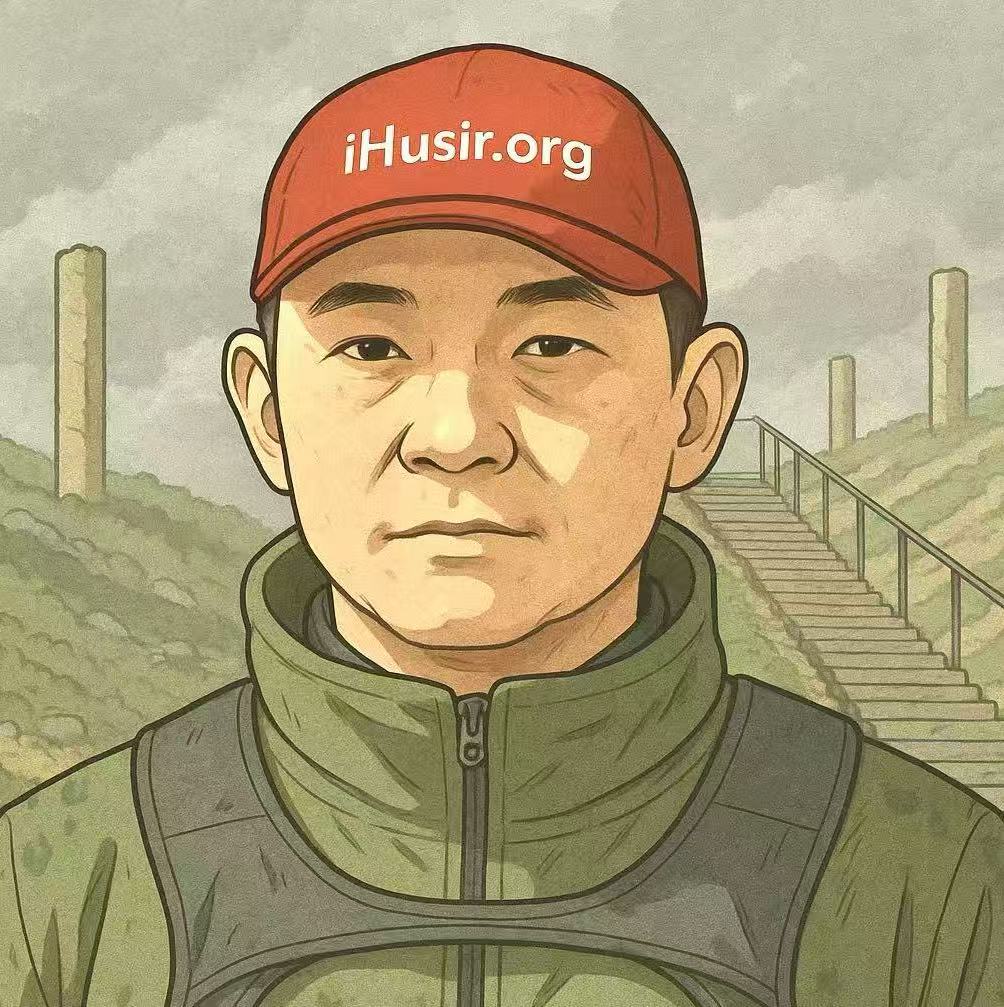——从思想改造到数字囚笼,我们还能重新站起来吗?
在七十多年的社会现实中,有一种悄无声息的失落,比失业更致命,比贫穷更深沉,那就是:一整个民族的勇气,正在慢慢消失。
我们不再敢表达真实感受,不再敢质疑荒谬政策,不再敢站出来保护弱者,甚至不再敢向自己的孩子讲出完整的事实。我们变得小心翼翼、委曲求全、表面服从、内心疲惫。这不是性格懦弱,而是一次又一次的现实打击与思想洗脑,把我们祖孙三代甚至可以遇见的下一代的勇气像钝刀割肉一样,从我们心中一寸寸割走。
这不是抽象的“民族性格”,这是一个历史性的过程,一场几代人亲历的“沉默炼狱”。
一、从“思想改造”开始:恐惧在脑中生根
新中国成立初期,政权的首要任务不是建设经济,而是掌控人心。镇反、肃清、斗争会、学习班……这些不仅清除了“异己”,更在整个社会播下了一种毒种:只要你质疑,就可能丧命;只要你开口,就可能祸及家人。
这种恐惧,在疫情期间被激活得淋漓尽致。你还记得最早通报疫情的那几位医生吗?被训诫,被封口,被牺牲。他们做错了吗?不,他们只是说出了事实。可大众听到的不是“真相”,而是“负面信息扰乱社会秩序”。于是,无数人学会了“闭嘴最安全”。
本该是每个人勇敢站出来核实信息、质问失职、保护彼此。但现实是,那些敢说真话的人,成了“造谣者”;而那些沉默的人,反而成了“乖孩子”。
二、用灾难“教育”你:反抗的下场是毁灭
到了六十年代,大饥荒和文革把恐惧转化成了灾难性的代价教育。“别说话,说了你就没饭吃”“别多嘴,会被打成反革命”。这不仅是生存威胁,更是社会集体的记忆创伤。
疫情三年里,封控、转运、禁足,恰恰唤醒了这种“灾难惩罚”机制。哪怕你只是出来买点奶粉、给孩子看病,只要你“顶撞了政策”,就可能被暴力执法。你敢提意见?就可能被冠上“寻衅滋事”的罪名。你要抗议封控?上海四通桥上的横幅告诉你,代价是监控、抓捕、消失。
于是,人们再次学会了“不出头,不反抗”。哪怕楼下起火了,也只敢在微信群里悄悄说“求助”。
三、用“大局观”掩盖良知:你不沉默,就是破坏稳定
八十年代后,勇气不再被直接镇压,而是被一种“政治正确话术”所软压制。“你这样说,是不是被境外势力带节奏了?”“你这么做,不利于国家抗疫大局。”“你要是没看到官方消息,那就别信谣传谣。”
疫情三年里,所有质疑都被贴上“别有用心”的标签,连一些温和的科学建议,也因为“不统一口径”被消声。许多专业人士明知动态清零不可持续,却不得不站台附和,因为他们知道,一旦说出真话,职位、研究项目乃至人生都可能被“封”。
真正的勇气,是在这种环境下仍愿意为真理发声——可惜,这种人越来越稀少,而沉默越来越普遍。
四、用利益换走勇气:你想保饭碗,就别质疑体制
00年代开始,体制对人的管控不再靠斗争,而是靠“好处”绑定。你是公务员、有编制、有房贷、有孩子要上学——你就会自己闭嘴,因为你知道:一旦你说了不该说的,就可能失去这些“成果”。
疫情期间,多少单位要求员工转发官方正能量消息,要求党员带头支持封控、赞成隔离、力挺“白纸换自由是幼稚病”。很多人明知荒谬,却因为要“稳住工作”,而不得不做出配合。在这种机制下,勇气被自动转化成“风险资产”,而沉默则成了“保本投资”。
几乎所有人这时候想起了利用“中国式虚伪的新包装”,那就是更隐秘的一层:我们不仅退缩了,还学会用“情商”“中庸”“成熟”来为退缩包装理由。明明是一个人不敢说真话、不敢做决定、不愿承担,他却会说:“做人别太极端”“情绪稳定是最重要的素养”“大智慧都是看破不说破”。
这就是中国式虚伪的精致版本——用孔孟之道的残片为软弱盖金边。“中庸”本是调和人际的美德,如今却被滥用成“不表态、不发声、不惹事”的懦弱借口;“情商高”原是理解他人的能力,如今却被理解为“能装傻、会识趣、不说实话”。
尤其在体制内,越是资深的人,越擅长用“老练”的口吻回避责任:“你懂的,这话咱们心里明白就行。”这些话看似“圆融”,实则让一代代人彻底失去了真诚与承担。
五、用技术彻底监控你的声音:没有私下表达的空间
今天,即便你有勇气,也没地方说。微信群、朋友圈、知乎、微博,甚至你和家人的聊天记录,都可能成为“被举报”的证据。你再也不是在“选择说或不说”,而是在“选择受罚或被禁言”。
疫情三年里,白纸运动的爆发短暂唤醒了被压抑的表达欲,但很快就被技术封杀:关键词屏蔽、视频下架、账号封禁、电话骚扰……每一个转发白纸图片的人,都在社交媒体上被“沉默”。
我们不是不知道真相,而是知道真相之后也无法改变什么,于是勇气,就在一次次的“转发失败”与“内容违规”中死去。

那么,走出沉默的代价与希望在哪里?
我们必须承认,勇气是有代价的。说真话可能失去职位,表达不满可能被警告、训诫,甚至失去自由。而回报呢?短期看似乎没有,甚至还会被孤立、被怀疑、被删帖。
但这并不代表“沉默就是更优选项”。因为你沉默得越久,你的下一代就越失去成为“自由人”的可能;你沉默得越久,良知就越像一具沉尸,终有一天会臭到你无法再忍受。
勇气真正的回报,不是名利,不是胜利,而是你可以面对镜子,知道自己是一个有尊严、有信仰的人。
解决之道,不是造反,而是悔改与真实
不要高估勇气的表演化,也不要低估诚实的力量。第一步,不是呐喊,而是不说谎;不是斗争,而是不再配合荒谬。当政策荒唐,你可以不附和;
- 当微信群洗地,你可以不点赞;
- 当朋友质疑时,你可以私下说:“其实我也有同感。”
- 当孩子问你,“为什么学校和电视说的不一样?”你可以勇敢说:“因为有些人不愿让大家知道真相。”
真正的悔改,是从不再用“体制语言”武装自己开始。真正的勇气,是在不能改变世界时,先保护你的心不被污染。而当更多人都悄悄这么做,改变就会悄悄发生。就像那场白纸运动——一开始只是一些女孩在夜里举纸,后来成了千万人在心中说出的那句:我们不要再沉默了。
这是我们的时代,我们的试炼。愿你不再觉得孤单,因为有越来越多的人在醒来,而他们都在等你,做出那一个小小的、真实的决定:
不再成为沉默的共谋者,而成为悔改的见证人。
How the Courage of Three Generations of Chinese Is Stolen
——From Thought Reform to the Digital Cage, Can We Stand Up Again?
In over seventy years of social reality, there lies a silent loss more deadly than unemployment and deeper than poverty: the courage of an entire nation is slowly disappearing. We no longer dare to express our true feelings, no longer dare to question absurd policies, no longer dare to stand up for the weak, and even no longer dare to tell our children the whole truth. We have become cautious, self compromising, outwardly compliant and inwardly exhausted. This is not mere cowardice of character, but the repeated blows of reality and brainwashing that have cut away the courage of three generations—and even of the next generation we might meet—inch by inch from our hearts, like a blunt knife slicing flesh. This is not an abstract “national trait,” but a historical process—a multi generational “purgatory of silence” lived by our ancestors, our generation, and our descendants.
I. Beginning with “Thought Reform”: Fear Takes Root in the Mind
In the early days of New China, the regime’s top priority was not economic development but controlling people’s hearts. “Suppress counter revolutionaries,” “clear out enemies,” “struggle sessions,” “study classes”… these not only eliminated “dissidents” but also sowed a poison throughout society: if you dared to question, you might lose your life; if you dared to speak, your family might suffer. That fear was unleashed in full force during the pandemic. Do you remember the doctors who first reported the outbreak? They were admonished, silenced, even sacrificed. Had they done wrong? No—they only spoke the truth. But the public heard not “the truth” but “negative information disrupting social order.” So countless people learned: “Keeping silent is safest.” In truth, each of us ought to have stepped forward to verify information, to demand accountability, to protect one another. Yet in reality, those who spoke the truth became “rumormongers,” while those who stayed silent were praised as “good children.”
II. Educating You with Disaster: The Fate of Resistance Is Destruction
By the 1960s, famine and the Cultural Revolution transformed fear into a catastrophic lesson: “Don’t speak—if you do, you’ll have no food”; “Don’t open your mouth—or you’ll be labeled a counter revolutionary.” This was not only a threat to survival but a collective trauma in social memory. During the three years of lockdowns, quarantine, and travel bans, this “punishment by disaster” mechanism was reawakened. Even if you merely went out for baby formula or to take your child to the doctor, if you “defied policy,” you risked violent enforcement. You dared to voice an opinion? You might be charged with “picking quarrels and provoking trouble.” You dared to protest lockdowns? The banners on Shanghai’s Sutong Bridge warned that the price was surveillance, arrest, disappearance. Thus people learned once again: “Don’t stand out, don’t resist.” Even if there were a fire downstairs, they only dared to whisper “help” in WeChat groups.
III. Masking Conscience with “Big Picture Thinking”: If You Don’t Stay Silent, You Undermine Stability
After the 1980s, courage was no longer directly suppressed but softly silenced by “politically correct” rhetoric: “Do you really think you’re not being guided by foreign forces?”; “What you’re saying harms the nation’s anti epidemic efforts”; “If you haven’t seen the official announcements, don’t spread rumors.” During the three years of the pandemic, every challenge was labeled “malicious intent.” Even mild scientific suggestions were muzzled because they didn’t maintain a “unified voice.” Many experts who knew “dynamic zero COVID” was unsustainable still had to publicly endorse it, because they understood that speaking the truth could cost their positions, research grants, even their livelihoods. True courage is speaking out for truth in such an environment—unfortunately, such people are growing scarce while silence becomes the norm.
IV. Trading Away Courage for Benefit: Want to Keep Your Job? Don’t Question the System
Since the 2000s, the regime’s control shifted from struggle to “incentive binding.” If you’re a civil servant with tenure, a mortgage, children to educate, you’ll keep silent, because you know: once you say the wrong thing, you risk losing these “accomplishments.” During the pandemic, countless workplaces required employees to share official positive messages, to have party members lead in supporting lockdowns, endorsing quarantine, praising “swapping blank sheets for freedom” as naïve. Many people knew the absurdity yet went along to “keep their jobs.” Under this mechanism, courage became a “risk asset,” while silence became a “safe investment.” Almost everyone then adopted a “new Chinese style hypocrisy”: not only did we retreat, but we learned to wrap our retreat in “emotional intelligence,” “moderation,” and “maturity.” A person who dared not speak the truth, dared not make decisions, dared not bear responsibility would say, “Don’t be too extreme,” “Emotional stability is the highest virtue,” “True wisdom is knowing when not to speak.” This is the refined version of Chinese hypocrisy—using fragments of Confucius and Mencius to gild weakness. Originally a virtue for interpersonal harmony, “the mean” is now abused into an excuse for “no stance, no voice, no trouble.” “High EQ” once meant understanding others; now it means “playing dumb, reading the room, never telling the truth.” Especially within the system, the more senior one is, the better one is at evading responsibility in a “seasoned” tone: “You know, we all understand this in our hearts.” These words sound “poised” yet they rob each generation of sincerity and accountability.
V. Ensnaring Your Voice with Technology: No Space for Private Expression
Today, even if you have courage, there is nowhere to speak. WeChat groups, Moments, Zhihu, Weibo—even chats with family may be reported as evidence. You no longer choose “to speak or not”; you choose “punishment or silence.” During the three year pandemic, the brief surge of the White Paper Movement awakened suppressed voices, only to be instantly crushed by technology: keyword filters, video takedowns, account bans, harassing calls… Every person who shared a blank sheet image was silenced online. We know the truth but feel powerless to change anything. Thus, courage dies, one failed repost and one “content violation” at a time.
So, What Is the Price of Breaking Silence—and Where Is Our Hope?
We must acknowledge: courage has a cost. Speaking truth may cost your position; expressing dissatisfaction may bring warnings, reprimands, even loss of freedom. And the immediate reward? Seemingly none—perhaps isolation, suspicion, or deletion of your posts. But that does not mean “silence is the better choice.” The longer you remain silent, the more your children lose the chance to become free people; the longer you remain silent, the more conscience decays until one day it will rot beyond endurance. The true reward of courage is not fame or victory, but looking in the mirror and knowing you are a person of dignity and faith.
The Solution Is Not Revolt but Repentance and Authenticity
Do not overestimate performative courage, nor underestimate the power of honesty. The first step is not a shout but refusing to lie; not a rebellion but refusing to cooperate with absurdity. When policies are ridiculous, you may refuse to endorse them; when WeChat groups are washing the narrative, you may refuse to “like”; when friends question you, you may quietly say, “Actually, I feel the same.” When your child asks, “Why do the school and TV say something different?” you may bravely answer, “Because some people don’t want everyone to know the truth.” True repentance begins when you stop arming yourself with “system language.” True courage protects your heart from pollution when you cannot change the world. And as more people quietly do this, change will begin to happen. Like that White Paper Movement—what began as a few girls raising blank sheets at night became millions speaking inside their hearts: “We will no longer be silent.” This is our era, our trial. May you know you are not alone, for more and more are awakening—and they are all waiting for you to make that small, true decision:No longer to be a silent accomplice, but to become a witness of repentance.
请填写您的邮箱,免费订阅作者最新文章。

发表回复